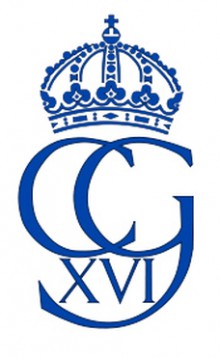Carl Gustaf Bernadotte became the 74th king of Sweden as Carl XVI Gustaf on September 15, 1973, at the age of 27 upon the death of his grandfather Gustaf VI Adolf. He chose the phase “For Sweden – with the times” as his personal motto, which emphasized his aspiration to meet modern requirements.
Carl Gustaf graduated from a private elementary school in Stockholm and a boarding school in Sigtuna. After passing the university entrance exams in 1966, he saw active military service in the Navy and the Air Force until 1968, when was commissioned as an officer at the Swedish National Defense College.
In 1968-70, Carl Gustaf took the courses of history, sociology, political sciences, law, and economics at Uppsala University as well as an economics course at the University of Stockholm.
After completing the studies, he received special training as the future head of state in 1970-73. The program included fact-finding visits to the central and local bodies of administration, companies, businesses, educational and research institutions; and studying the affairs of courts, social security bodies, trade unions, employers’ associations. The program envisaged special focus on the functioning of the Swedish government, the Riksdag (parliament), and the Ministry of Foreign affairs. To gain the experience of international relations, Crown Prince Carl Gustaf also spent time at the Swedish Mission to the United Nations and the Swedish International Development Cooperation Agency (SIDA), worked at the Hambros Bank in London, at the Swedish Embassy in London, and at the Swedish Chamber of Commerce in France. In 1970 he led the Swedish delegation to the World Exposition (Expo 70) in Osaka, Japan.
In accordance with the changes to the Constitution of Sweden, which were introduced in 1974 and came into force on January 1, 1975, the king of Sweden is in fact deprived of any governmental powers. The real power is wielded by the Riksdag and the Cabinet with the prime minister at the head. The king usually performs representative and ceremonial functions: he makes state visits abroad, receives letters of credence from foreign ambassadors, opens annual Riksdag sessions, and presides over special Cabinet meetings. He also chairs the meetings of the Foreign Affairs Council which consist of Riksdag and Cabinet representatives.
Although the king has the highest military rank (Admiral of the Royal Navy), the armed forces are fully managed by the government.
The royal couple is traditionally present at the annual Nobel Prize ceremony in Stockholm on December 10. The king of Sweden personally hands in the Nobel Prize.
King Carl XVI Gustaf likes dealing with environmental protection. He is president of the Swedish branch of the World Wide Fund for Nature. At the same time, he takes an interest in modern technologies, actively participates in Royal Technological Missions organized by the Royal Swedish Academy of Engineering Sciences to encourage Swedish export of technologies and know-how, and patronizes the Royal Academy of Sciences.
The king holds honorary doctoral degrees from the Swedish University of Agricultural Sciences, the Royal Institute of Technology, the Abo Akademi University in Turku, Finland.
He is the knight of the Swedish royal orders of the Seraphim, the Polar Star, Vasa, and Charles XIII, and is the first-ever Honorary Fellow of Uppsala University. The king has a number of foreign honors. On March 19, 1999, he was awarded the Order of Prince Yaroslav the Wise, 1st Degree, and he was the first recipient of the Ukrainian Order of Liberty on September 29, 2008.
King Carl XVI Gustaf of Sweden visited Kyiv in June 1978 as part of his state visit to the USSR.
The Swedish king and his wife, Queen Silvia, paid a state visit to Ukraine on September 30 – October 3, 2008.
The monarch and the royal family enjoy great prestige and respect in Swedish society.







